Plato’s Philosophy and Cloud Computing System with a Cognitive Approach
DOI:
https://doi.org/10.47852/bonviewAIA32021298Keywords:
philosophy of Plato, forms, things, cloud computing, IoT, cognitive system, cognitive humanoid robotAbstract
In this study, a cognitive approach has been adopted to examine the relationship between Plato’s philosophy and modern cloud computing systems. Plato’s theory of forms has been conceptualized within the framework of digital technologies, establishing a parallel between the metaphysical world of ideas and cloud-based data processing. The epistemological and computational intersections between these domains have been analyzed, focusing on how knowledge is structured, stored, and processed in contemporary cognitive systems. The interaction of cognitive humanoid robots with cloud environments has been investigated, and their role in the dynamic acquisition and utilization of knowledge has been highlighted. A model integrating statistical and algorithmic interpretations of Plato’s cognitive cycle has been proposed, demonstrating its relevance to AI-assisted learning mechanisms. Through comparative evaluations, cloud computing has been identified as a structured system that facilitates data abstraction and transfer, reflecting the epistemological process outlined in Plato’s philosophy. The findings have shown that the cognitive functions of cloud-based AI systems align with Plato’s philosophical constructs, particularly in the area of knowledge representation and processing. Furthermore, statistical modeling of knowledge acquisition in cloud systems has been examined to establish a formal relationship between idealized knowledge structures and real-world applications. A systematic analysis of cloud computing and Internet of Things (IoT) technologies has been conducted, and the significance of maintaining the connection between Plato’s forms and sensory experiences has been identified. The results indicate that cloud-based AI solutions correspond to Plato’s conceptual structures, particularly in the processing and abstraction of knowledge.
Received: 29 June 2023 | Revised: 24 July 2023 | Accepted: 14 August 2023
Conflicts of Interest
The authors declare that they have no conflicts of interest to this work.
Data Availability Statement
Data sharing is not applicable to this article as no new data were created or analyzed in this study.
Author Contribution Statement
Serhat Seker: Conceptualization, Methodology, Validation, Formal analysis, Investigation, Resources, Writing - original draft, Writing - review & editing, Visualization, Supervision, Project administration. Tahir Cetin Akinci: Methodology, Software, Investigation, Data curation, Writing - review & editing, Visualization. Ahmet Ozturk: Formal analysis, Investigation.
Downloads
Published
Issue
Section
License
Copyright (c) 2023 Authors

This work is licensed under a Creative Commons Attribution 4.0 International License.


